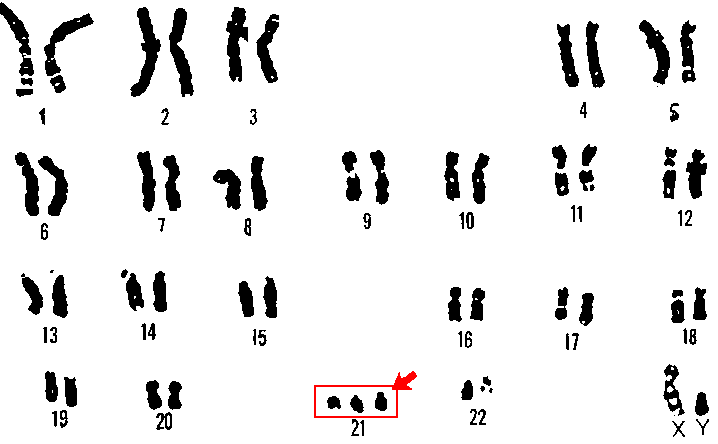The karyotype of 21 trisomy (Down syndrome). Credit: US Government, Public Domain
Problems with insulin secretion experienced by people with Type 2 diabetes, parallel similar problems with insulin-secreting beta cells in many individuals with Down syndrome. A new study, published on May 19 in PLOS Genetics by Professor Damien Keating of Flinders University and colleagues, has used this knowledge to identify a single gene that may cause these problems.
Many individuals with Down syndrome experience lower insulin secretion, mitochondrial dysfunction and increased oxidative stress in the insulin-producing beta cells of the pancreas; conditions that also appear in people with Type 2 diabetes. Down syndrome is the most common genetic disorder and occurs when a person has an extra copy of some or all of chromosome 21. To identify genes duplicated in Down syndrome that contribute to problems with insulin secretion, scientists screened the genes of four mouse models of the disorder—two had high blood sugar and two did not. They narrowed down the list by comparing it to genes overexpressed in beta cells from humans with Type 2 diabetes. The comparison identified a single gene, RCAN1, which, when overexpressed in mice, causes them to have abnormal mitochondria in their beta cells, produce less ATP and secrete less insulin in the presence of glucose.
The results of the study not only explain why individuals with Down syndrome are more likely to have Type 1 diabetes, but have revealed the function of a gene that may be playing a lead role in development of Type 2 diabetes in the general population. This approach could be applied to other health disorders with symptoms that also appear in individuals with Down syndrome.
More information: Peiris H, Duffield MD, Fadista J, Jessup CF, Kashmir V, Genders AJ, et al. (2016) A Syntenic Cross Species Aneuploidy Genetic Screen Links RCAN1 Expression to β-Cell Mitochondrial Dysfunction in Type 2 Diabetes. PLoS Genet 12(5):e1006033. DOI: 10.1371/journal.pgen.1006033
Journal information: PLoS Genetics
Provided by Public Library of Science





















